The Copper Cure: Fixing Your Gas Line Like a Pro
By Brian on October 9, 2025
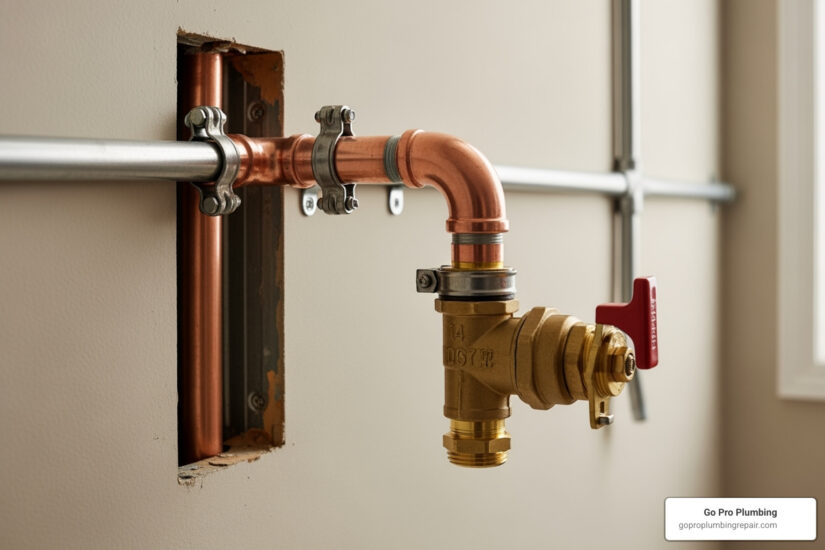
The Critical Importance of Gas Line Safety
When you need to repair copper gas line damage, safety is the top priority. Gas line work is one of the most dangerous DIY projects, where a single mistake can lead to explosions, fires, or deadly carbon monoxide poisoning.
Quick Answer for Copper Gas Line Repair:
- Shut off gas immediately at the meter or main valve
- Evacuate the area and ventilate if you smell gas
- Code-approved methods: Brazing, flare fittings with forged nuts
- Never use: Compression fittings, epoxy, or tape on gas lines
- Professional repair recommended for safety and code compliance
- Cost: $100-300+ for professional repair vs. potential disaster from DIY mistakes
Copper gas lines are common in Northern California homes. While durable, they can fail due to corrosion, accidental damage, or impurities in the gas supply. A professional repair might cost over $100, but this is minimal compared to the risks of an improper fix. Gas line damage can go unnoticed for years, posing a silent but serious threat.
Unlike water line repairs, gas lines demand permanent, code-approved solutions. The National Fuel Gas Code (NFPA 54) strictly governs the materials and methods that are safe for gas line repairs, underscoring the need for professional expertise.
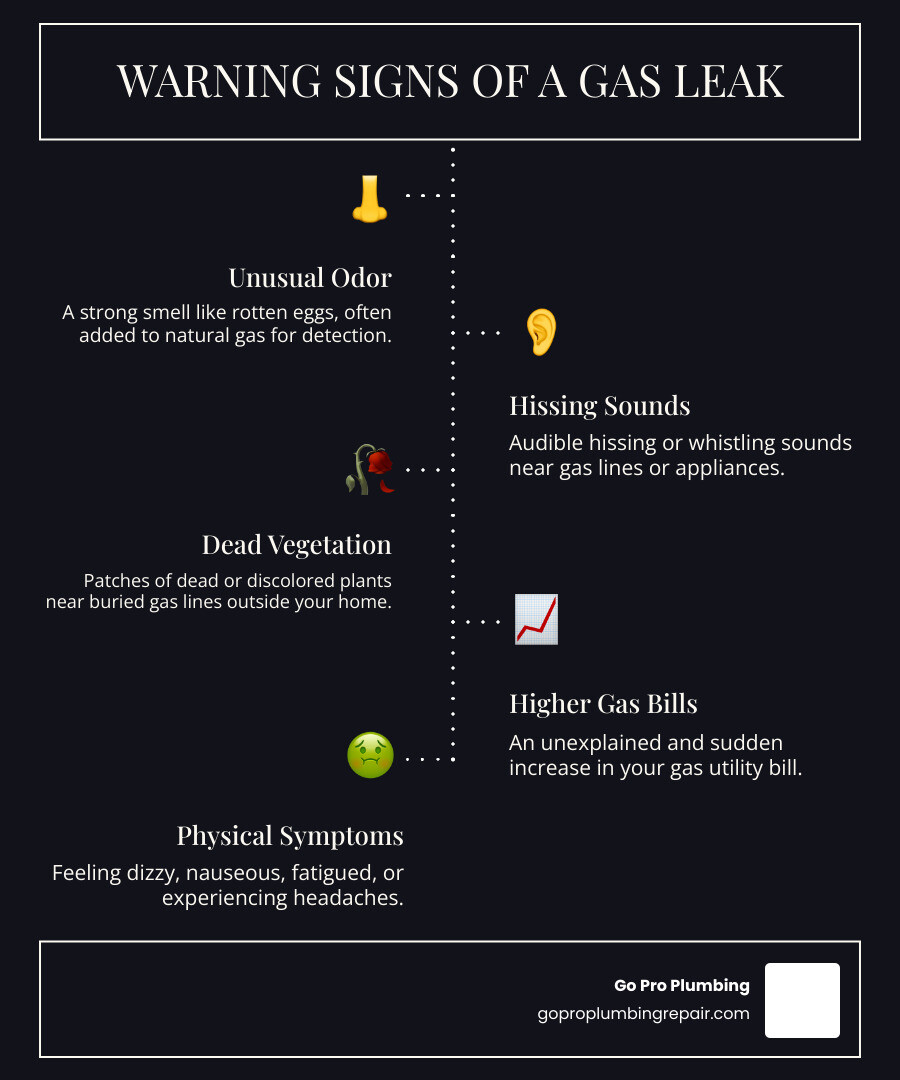
Repair copper gas line vocab to learn:
First Steps: Identifying and Assessing the Gas Leak
If you suspect a gas leak, your first priority is safety, not an immediate attempt to repair copper gas line damage. Key signs of a leak include:
- A distinct rotten egg smell from the additive in natural gas.
- Hissing sounds from gas escaping under pressure.
- Dead or yellowing vegetation near outdoor gas lines.
- Unexplained increases in your gas bill.
- Physical symptoms like headaches or dizziness that improve when you leave the house.
The moment you suspect a leak, take these steps:
- Do not use anything that could create a spark. This includes light switches, appliances, phones, or lighters.
- Evacuate everyone immediately.
- If possible, open doors and windows to ventilate the area.
- From a safe distance outside, call your gas company’s emergency line and 911.
- If you know where your main gas shut-off valve is and can access it safely, turn it off. Use a wrench to give the valve a quarter turn until it is perpendicular to the pipe.
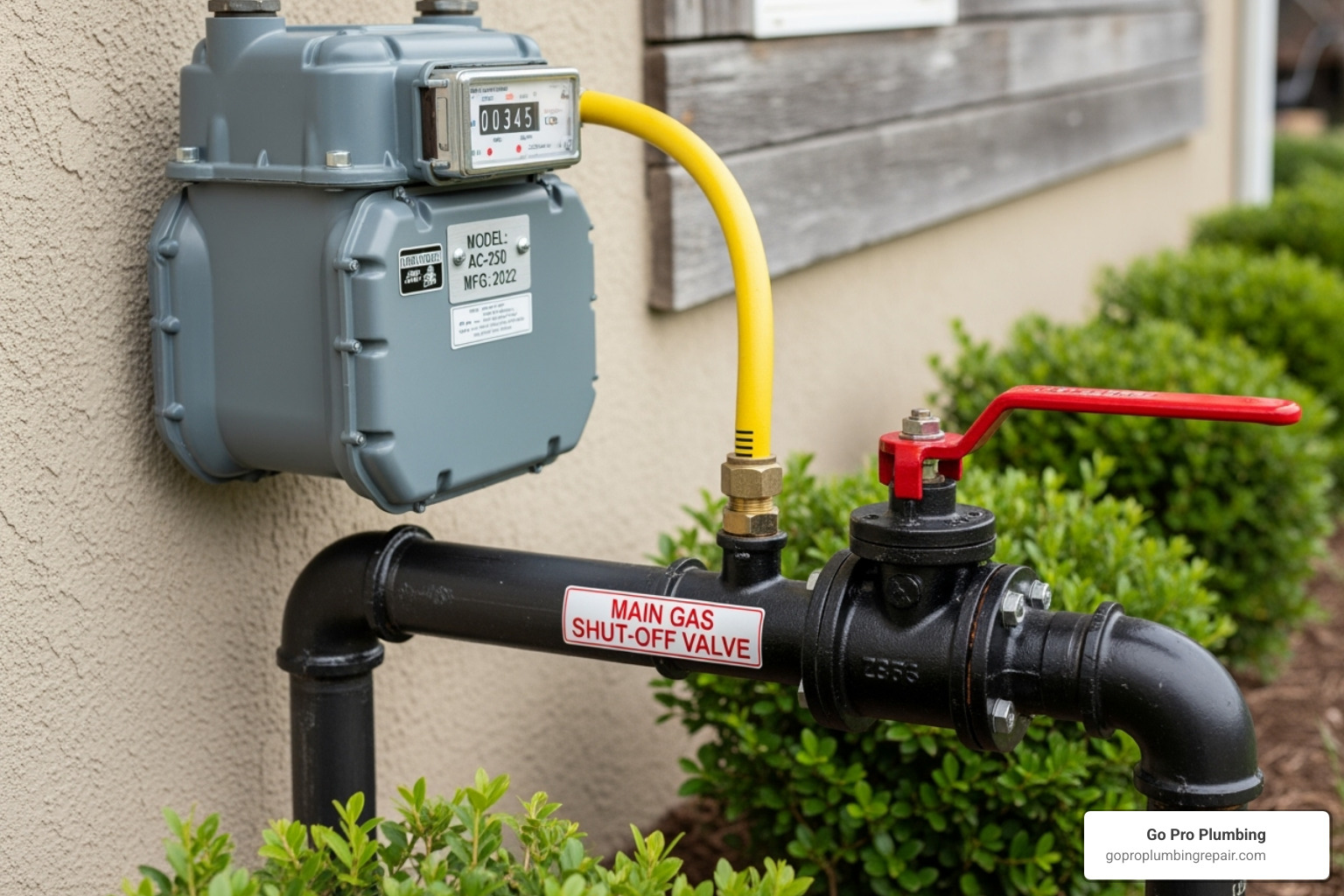
How to Perform a Soapy Water Leak Test
After the gas is off and the area is confirmed safe, you can pinpoint the leak with a soapy water test. Mix liquid dish soap and water in a spray bottle and apply it generously to suspected areas on the copper line. If a leak is present, the escaping gas will form visible, growing bubbles. Mark the spot so you can show the professional.
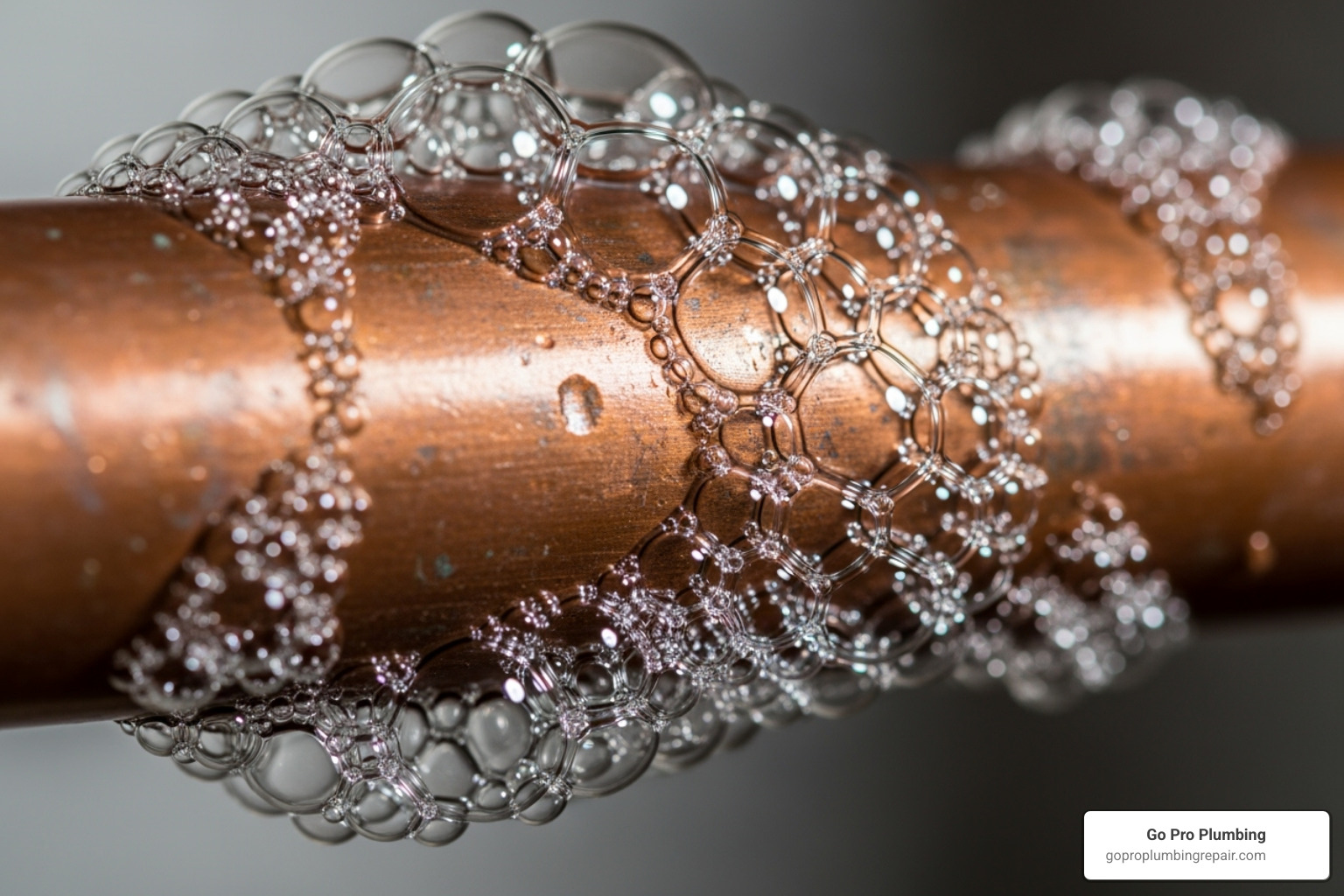
Common Causes of Copper Gas Line Damage
Copper gas lines can fail for several reasons:
- Pitting corrosion: Tiny holes caused by chemicals in the gas supply.
- Accidental damage: Punctures from nails or damage during construction.
- Dents and kinks: These restrict gas flow and can lead to appliance malfunction and carbon monoxide production.
- Improper installation: Lack of proper support can cause stress fractures over time.
- Material degradation: Copper, like any material, can degrade with age.
For tips on keeping your gas lines healthy and catching problems early, check out our guide on gas line maintenance.
Step-by-Step Guide to Repair Copper Gas Line
This guide explains how professionals repair copper gas line damage. It is for informational purposes only. Due to the extreme risks of fire, explosion, and poisoning, gas line repair is NOT a DIY project and must be handled by a certified technician.
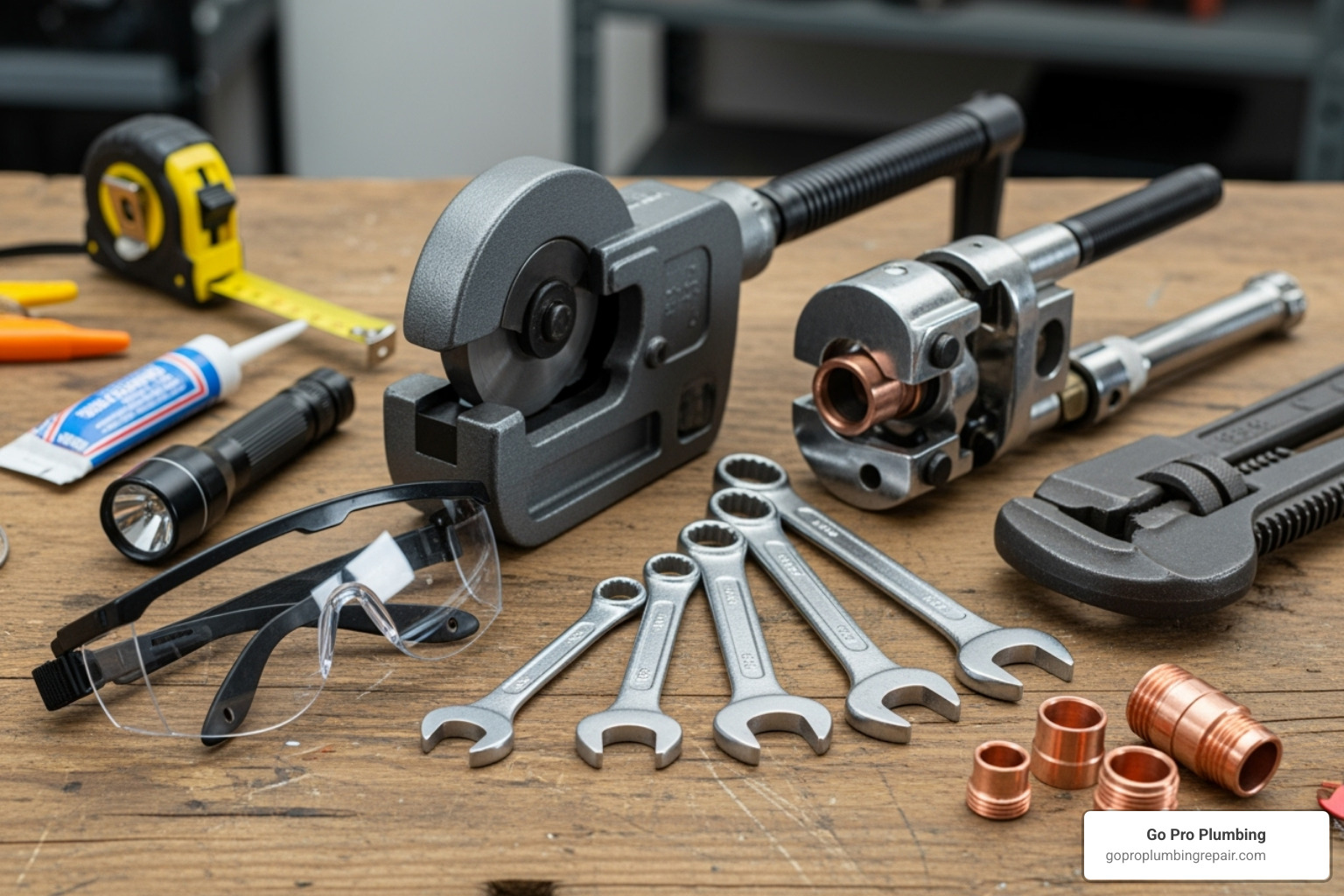
Professionals use only permanent, code-approved methods for gas line repairs. The specialized tools and safety equipment required represent a significant investment, but the real value is in the technician’s training and experience.
Here’s how the main repair methods stack up for gas line work:
| Method | Pros | Cons | Safe for Gas Lines? |
|---|---|---|---|
| Brazing | Super strong, permanent, handles high temps | Needs specialized skills, certification required | Yes (Professional only) |
| Flare Fittings | Strong mechanical seal, no heat needed | Requires proper tools and technique | Yes (Professional only) |
| Compression Fittings | Easy to install, no special tools | Prone to leaks, fails under vibration | Absolutely NOT |
Code-Approved Methods for a Permanent Repair of a Copper Gas Line
Professionals rely on two primary methods for a permanent repair copper gas line job: brazing and flare fittings. Both create secure, leak-proof connections that meet strict safety codes.
Brazing creates an incredibly strong bond by joining metals with a filler material at high temperatures (over 840°F). A professional uses a specialized torch to heat the copper pipe and fitting, then applies a brazing rod. Capillary action draws the molten filler into the joint, creating a seamless, permanent seal. This process requires certified skill to perform safely and effectively.
While the video on how to solder a copper joint shows a similar concept for water pipes, gas line work involves different materials, higher stakes, and requires professional certification.
Flare fittings create a strong mechanical seal without heat. This method is often used to connect copper tubing to appliances. A technician uses a special flaring tool to create a precise 45-degree cone on the end of the pipe. This flared end is then pressed against a fitting and secured with a flare nut. The quality of the flare is critical; an imperfect flare will leak. Proper technique and tools are essential.
For any gas line work, it’s crucial to hire a licensed gas fitter who understands the technical requirements and local codes.
Temporary Fixes and Why They Aren’t for a Copper Gas Line Repair
When it comes to gas lines, there is no such thing as a safe temporary fix. Products that might work for a minor water leak are extremely dangerous when used with flammable gas.
- Repair clamps, epoxy putty, and pipe wrap tape are not rated for gas pressure and are not code-approved for gas lines.
- These DIY solutions are prone to failure under the vibrations and pressure changes common in gas systems.
- A failed “temporary” patch can lead to a catastrophic leak, resulting in fire, explosion, or carbon monoxide poisoning.
The bottom line is simple: even a small gas leak demands professional attention. If you’re dealing with any gas pipe leak, our team provides professional gas pipe leak repair services that prioritize your safety.
Safety First: Essential Precautions and Regulations
When it comes to any repair copper gas line work, safety is a matter of life and death. A single mistake can have catastrophic consequences. Professionals follow a strict safety protocol:
- Shut Off the Gas Main: Before any work begins, the gas supply must be shut off at the main meter. This is non-negotiable.
- Ventilate the Area: Windows and doors are opened to disperse any lingering gas, which can accumulate in enclosed spaces.
- Eliminate Ignition Sources: All potential sources of sparks must be removed. This includes open flames, pilot lights, and electricity. Professionals often turn off circuit breakers to the work area to prevent accidental sparks from switches or tools.
- Use Personal Protective Equipment (PPE): Technicians use safety glasses, heat-resistant gloves, and other necessary PPE.
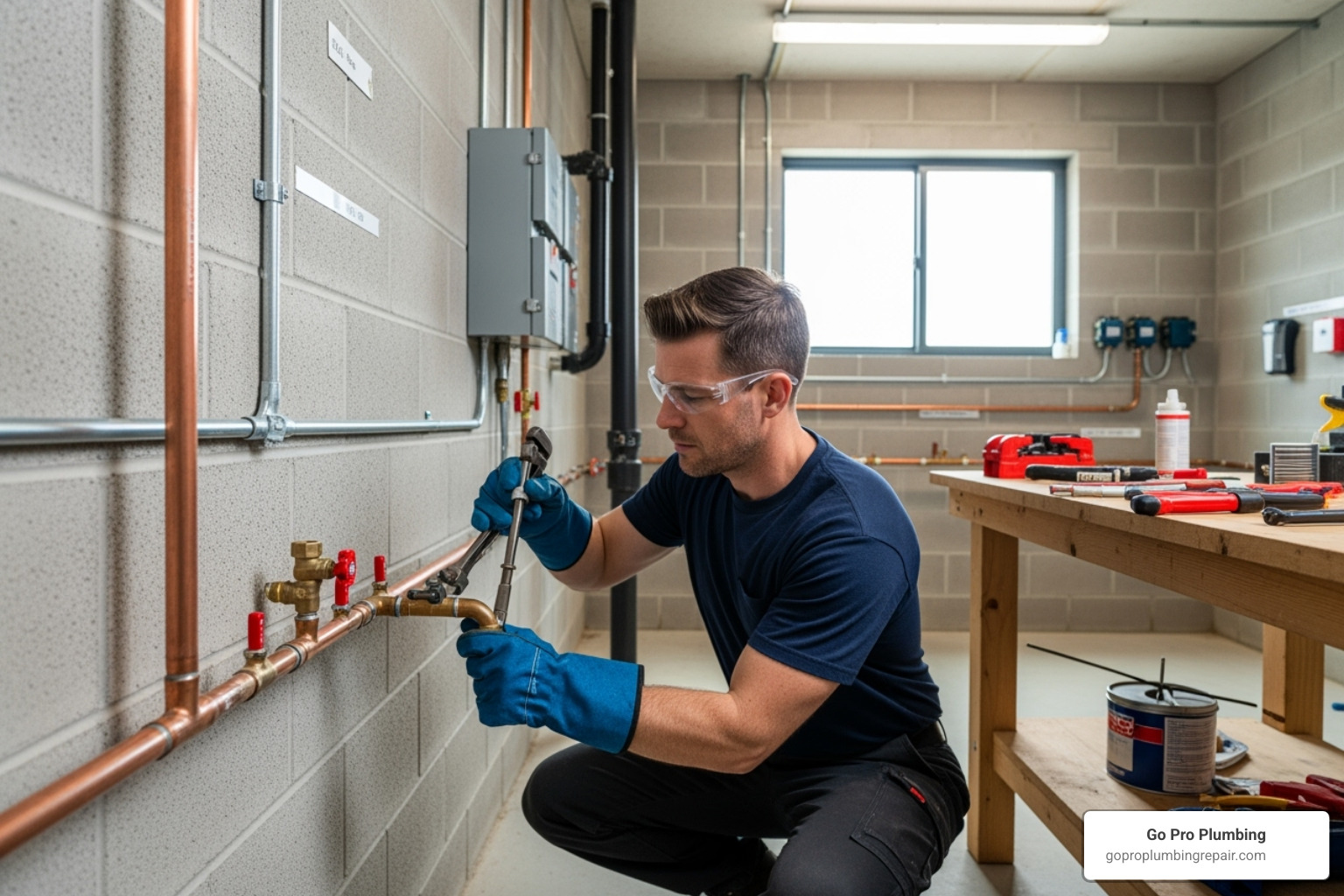
Gas line work is heavily regulated. The National Fuel Gas Code (NFPA 54) and local codes in Northern California are not suggestions; they are legally enforceable requirements designed to prevent tragedies. These codes dictate acceptable materials and repair methods, which can vary by location.
A final, critical step is post-repair pressure testing. A professional uses specialized gauges to test the entire system, ensuring the repair is completely leak-free. This is a mandatory step that verifies the safety and integrity of the work.
The Dangers of an Improper Repair
Botching a gas line repair can be deadly. The consequences of cutting corners include:
- Gas Explosions: An accumulation of gas mixed with a single spark can create an explosion powerful enough to level a house.
- Fire Hazards: A leaking gas line that ignites can create an hot fire (over 3,500°F) that spreads rapidly.
- Carbon Monoxide (CO) Poisoning: An improper repair can restrict gas flow, causing appliances to burn fuel incompletely. This produces carbon monoxide, a colorless, odorless gas that is a silent killer.
- Legal and Financial Liability: Insurance companies typically deny claims for damage caused by unpermitted or improper gas work, leaving you personally liable for all damages and injuries.
In a gas line emergency, don’t risk it. Contact our team for professional emergency gas line service and let trained technicians handle the work safely.
When to Call a Professional Plumber
The time to call a professional for a repair copper gas line issue is immediately. This guide is meant to inform you about the process, not to serve as a DIY manual. Gas line repair carries life-or-death stakes and is not a project for homeowners.
You should always call a professional, especially in these situations:
- Large or Multiple Leaks: This could indicate a systemic problem, like widespread corrosion, that requires a full professional assessment.
- Lack of Experience or Tools: Safe gas line repair requires expensive, specialized tools (brazing torches, flaring kits) and, more importantly, certified training to use them correctly.
- Underground Gas Lines: Repairing buried lines involves excavation and adherence to strict safety protocols and material requirements.
- Uncertainty About Codes: Gas codes vary by municipality. A professional will know the specific requirements for your area in Northern California.
- If the Gas Company Shut Off Your Service: Utilities require repairs to be completed and inspected by a licensed professional before restoring service.
Hiring a professional provides peace of mind. Knowing the job was done correctly and safely by a certified technician is invaluable. Your family’s safety is worth far more than any potential savings from a DIY attempt.
Can a plumber fix a gas leak? Yes, licensed plumbers with gas certification are the experts you need. They are trained and equipped to handle these repairs safely and according to code. Learn more in our article on whether a plumber can fix a gas leak.
The bottom line is simple: gas line repair isn’t worth the risk of doing it yourself. The potential consequences—explosions, fires, carbon monoxide poisoning, legal liability—far outweigh any money you might save.
Frequently Asked Questions about Copper Gas Line Repair
Homeowners often have questions when they need to repair copper gas line damage. Here are answers to the most common concerns we hear from our Northern California customers.
Is it legal for a homeowner to repair their own gas line?
While laws vary by location, it’s almost always a bad idea and often illegal. In many parts of Northern California, any work on gas lines requires a permit and must be performed by a licensed professional. Even where technically allowed, the extreme risks of explosion, fire, and carbon monoxide poisoning make DIY gas work incredibly dangerous. Furthermore, if an unpermitted repair causes damage or injury, you could face severe legal and financial liability. Our professional recommendation is to always leave it to the experts.
Can you use compression fittings on a copper gas line?
No. Compression fittings are not permitted for gas lines under most codes. While they are common for water lines, they are prone to leaking over time when subjected to the vibrations and pressure changes of a gas system. Gas leaks are too dangerous to risk an insecure connection. Code requires more robust methods like brazing or flare fittings with forged nuts, which create a reliable, long-term seal designed for the demands of gas service.
How much does a professional copper gas line repair cost?
The cost of a professional repair depends on several factors, including local labor rates, material costs, and the complexity of the job. A simple, accessible repair might cost a few hundred dollars, while a more complex job involving wall demolition or underground lines could cost over a thousand. Emergency after-hours service will also affect the price.
While a service call may start at over $100, this cost is an investment in your family’s safety. When compared to the potential cost of a fire or explosion, professional repair is the only sensible choice. Trying to save money on gas line repair is a risk that is never worth taking.
Conclusion: Ensure Your Repair is Safe and Secure
From identifying a leak to understanding how professionals repair copper gas line damage, the most important takeaway is this: your family’s safety is worth more than any DIY savings.
Gas line repair is not a typical home improvement project. A single mistake can lead to devastating consequences, including explosions, fires, and carbon monoxide poisoning. These are not scare tactics; they are the real-world risks of improper gas work.
Always remember the key safety principles: shut off the gas, evacuate the area, and call for professional help. Never use temporary fixes like tape, epoxy, or compression fittings on a gas line. Only code-approved methods like brazing and flare fittings, performed by a trained technician, are acceptable.
When you face a gas line issue, you need a professional who understands Northern California’s codes, uses the right tools, and performs rigorous pressure testing to guarantee a safe, lasting repair.
Go Pro Plumbing’s certified technicians provide exactly that. We do the job right—safely, efficiently, and with the outstanding customer service you deserve. We know gas line problems are urgent, and we’re here to help when you need us most.
Don’t gamble with your home and family. For reliable gas line services in Rancho Cordova, Sacramento, and across Northern California, trust the experts.
